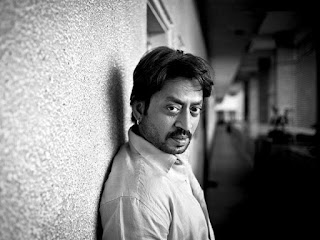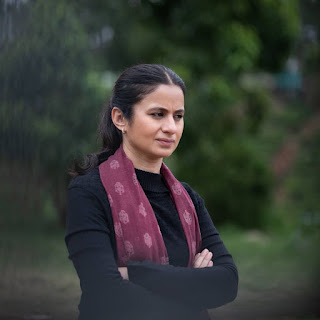Qisse: In loving memory of Irrfan
Radhika Bhirani
rbhirani@gmail.com
Irrfan Khan, his close ones say, disliked celebrating birthdays. But for his fans across the world, today is really about celebrating his life. A life shaped by excellence and magnificence on screen, a life defined by intelligence and benevolence off screen.
Think of him, and you smile. You smile -- about the many roles he played; those which easily escaped the brackets of the conventional hero of Indian cinema, yet had a heroism of their own -- and about his pleasant idiosyncrasies and ideology. Irrfan, you would agree, is missed. The actor would have turned 54 today.
He had his own style and sense of humour, bits of which I sampled in two of my brief meetings with him. Once in 2013. In Abu Dhabi, where in the middle of an interview, he started rolling his own cigarette. "Kuchh gadbad nahin hai," he commented with a laugh to quell the look of curiosity on my face.
My second, and unfortunately last meeting with Irrfan was ahead of his 2017 release Hindi Medium. He was seated comfortably on a sofa of hotel room, and responded to my set of questions patiently while eating out of a basket of fruits. When I popped a question about how the movie had managed to bypass the hullabaloo over the inclusion of Pakistani talent in Indian films, he smiled, and gave me a look. With his deep-set eyes. And came the answer.
"Angoor khaa lo," he said, offering the fruit basket, before returning to the conversation in his inimitable style and saying, "You always feel lucky when there's no controversy...kis baat ka batankar bann jaayega, pata nahi chalta!"
Not every death in the cine world feels like a personal loss. Not every death makes eyes well up with tears. When Irrfan died after a brave battle against a serious illness, it had these effects. The heart ached, as it did for his several of his fans, friends, fraternity members and family.
Building bonds and connecting with people -- or nature -- came naturally to him.
"He spoke with the camels, conversed with the stars, whispered to the sand dunes and the deep dark nights, and eventually he became a part of it after presenting it to the prestigious Locarno film festival in Switzerland, before the film released in India," Sikdar wrote in a recent Facebook post about Irrfan's tryst with Jaisalmer in Rajasthan -- the state where he was born -- and where he shot for The Song of Scorpions, his last film.
Helmed by his Qissa director Anup Singh, the movie will release sometime this year.
Irrfan essays a camel trader. Cast opposite him is Iranian actor Golshifteh Farahani. A quick look at the project details on IMDb tells you that she plays Nooran, a "carefree and defiantly independent" tribal woman. And that thread about the reel Nooran bodes well with the real Farahani, who was forced into exile from her home country Iran for posing nude for a French magazine.
As it happens, when I met Irrfan, Anup Singh and Golshifteh Farahani first at the Abu Dhabi Film Festival, is also where the three of them met.
Irrfan, I remember, was mighty impressed after watching her performance in the Kurdish film My Sweet Pepper Land. As was she after watching his Qissa. She told me she was in awe of Irrfan's performance and that she admired his versatility.
Recently, I took the chance of asking Singh if the genesis of the casting for The Song of Scorpions happened there and then? And here's what he narrated -- a piece that can tell you how Irrfan also had a way of reading people's minds.
"As you know, Golshifteh is a person living in exile. She’s an outsider wherever she goes. And as a woman and an actress, living and attempting to make a career in the West, she knows another kind of exile: the one that could easily create a border around her of stereotyped roles. During the two days we spent together at the festival in Abu Dhabi, what increased my admiration and respect for her was that while she lives the pain and dread of separation from country and family at every moment of her day, she has never allowed that to embitter her or make her vindictive in any way.
"Instead, she has learned to allow her sense of separation to open herself to other possibilities of herself. She has learned to celebrate the insight that we are all truly and finally strangers to ourselves - and it’s that acceptance that makes her the soul-stirring and versatile actress that she is."
Both Irrfan and he, Singh shared, soon realised that Golshifteh’s journey as a person and artiste in many ways mirrors Nooran, the female protagonist’s journey in The Song of Scorpions.
"Nooran, too, has to journey into an exile, cut from her own body and identity, fight her primal instinct to seek vengeance and, finally, learn to celebrate herself. At the end of our time together at the festival, Irrfan said to me, smiling, 'You're going to cast her, aren't you?' And as Irrfan said later, he understood The Song of Scorpions through the face of Golshifteh."
He had a special place in his heart for international cinema. Not to say he undermined cinema from his own country. He just liked the different kind.
Irrfan told me once, "We cannot continue being known as item number filmmakers. Bollywood is known as an item number, and we have to change that. We have to connect with a universal audience... As filmmakers and as an industry, we need to establish our presence in bigger markets. That's what Hollywood is doing in India. And that's what we need to do in the rest of the world."
Personally, there was a lot he did -- and wanted to do. An ardent music lover, he desired to learn how to play the saxophone.
At a masterclass, Irrfan was asked how he had managed to set an equilibrium in life while doing different things like struggling between Hollywood, Bollywood, and the independent film scene of India.
His answer stays in my mind.
"Doing different things sets the equilibrium. Every time you take up something new, it relieves you and gives you freshness. In fact, if you do one kind of thing all the time, then the question of finding an equilibrium arises."
As it happens, when I met Irrfan, Anup Singh and Golshifteh Farahani first at the Abu Dhabi Film Festival, is also where the three of them met.
Irrfan, I remember, was mighty impressed after watching her performance in the Kurdish film My Sweet Pepper Land. As was she after watching his Qissa. She told me she was in awe of Irrfan's performance and that she admired his versatility.
"As you know, Golshifteh is a person living in exile. She’s an outsider wherever she goes. And as a woman and an actress, living and attempting to make a career in the West, she knows another kind of exile: the one that could easily create a border around her of stereotyped roles. During the two days we spent together at the festival in Abu Dhabi, what increased my admiration and respect for her was that while she lives the pain and dread of separation from country and family at every moment of her day, she has never allowed that to embitter her or make her vindictive in any way.
"Instead, she has learned to allow her sense of separation to open herself to other possibilities of herself. She has learned to celebrate the insight that we are all truly and finally strangers to ourselves - and it’s that acceptance that makes her the soul-stirring and versatile actress that she is."
Both Irrfan and he, Singh shared, soon realised that Golshifteh’s journey as a person and artiste in many ways mirrors Nooran, the female protagonist’s journey in The Song of Scorpions.
"Nooran, too, has to journey into an exile, cut from her own body and identity, fight her primal instinct to seek vengeance and, finally, learn to celebrate herself. At the end of our time together at the festival, Irrfan said to me, smiling, 'You're going to cast her, aren't you?' And as Irrfan said later, he understood The Song of Scorpions through the face of Golshifteh."
He had a special place in his heart for international cinema. Not to say he undermined cinema from his own country. He just liked the different kind.
Irrfan told me once, "We cannot continue being known as item number filmmakers. Bollywood is known as an item number, and we have to change that. We have to connect with a universal audience... As filmmakers and as an industry, we need to establish our presence in bigger markets. That's what Hollywood is doing in India. And that's what we need to do in the rest of the world."
Personally, there was a lot he did -- and wanted to do. An ardent music lover, he desired to learn how to play the saxophone.
At a masterclass, Irrfan was asked how he had managed to set an equilibrium in life while doing different things like struggling between Hollywood, Bollywood, and the independent film scene of India.
His answer stays in my mind.
"Doing different things sets the equilibrium. Every time you take up something new, it relieves you and gives you freshness. In fact, if you do one kind of thing all the time, then the question of finding an equilibrium arises."







Comments
Post a Comment